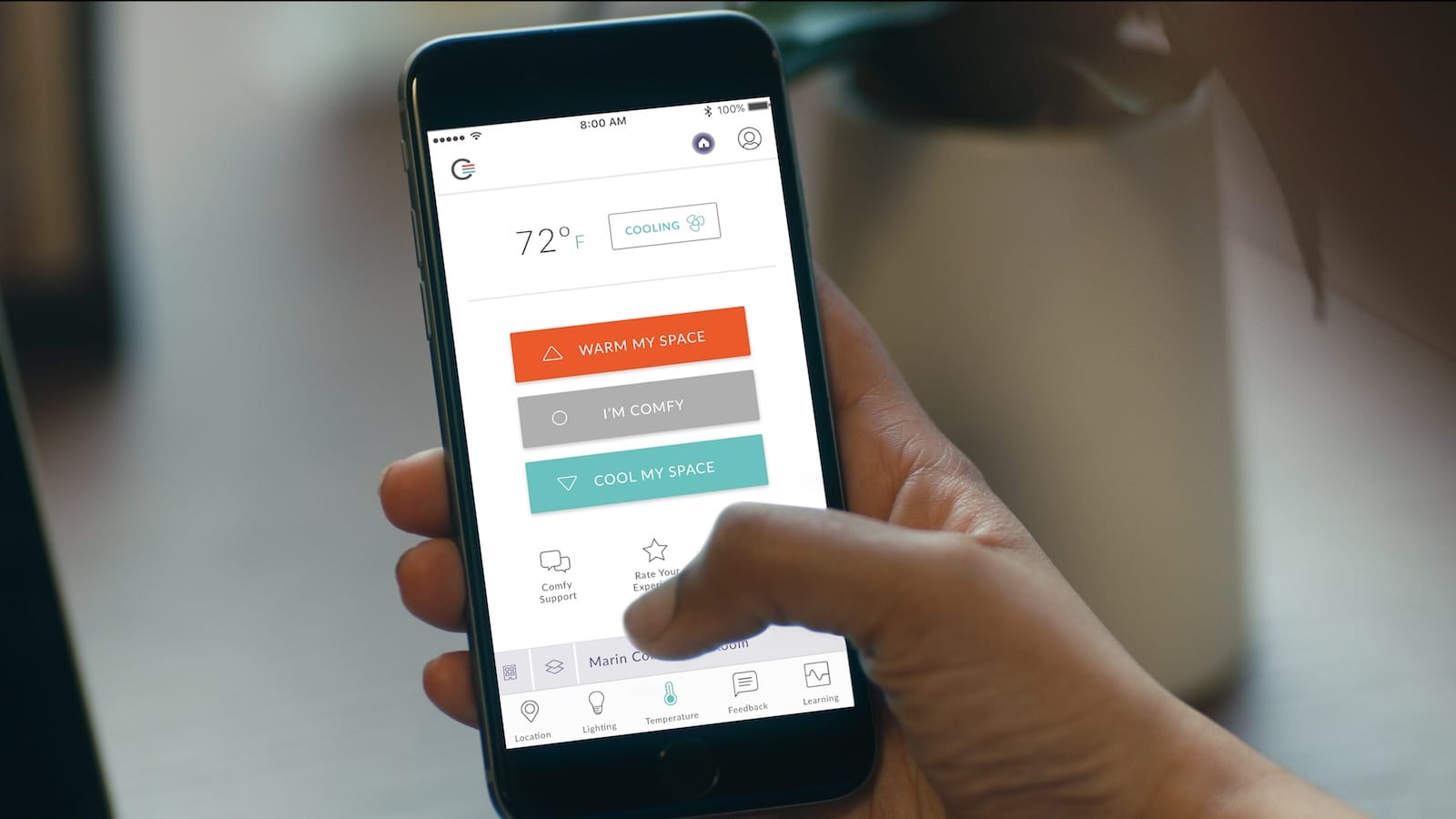The Internet of Things (IoT) and smart buildings sectors are realising that when you focus building design and technology on people, you bring about better results. The objective of a smart building is fundamental to this idea; in a smart hospital the IoT can be focused on aiding healthcare professionals and supporting patients to improve care; in the smart home by focusing on the occupants the IoT can create more comfort and security; while in the smart office a people centric focus can bring about greater productivity.
Putting this theory into action, workplace experience app Comfy (formerly Building Robotics) is leveraging IoT to give people greater choice and control over their workplace. Last year, Comfy's people-centric approach led to a $12 million funding round led by Emergence Capital, with participation from other investors including CBRE Group, Inc. and Microsoft Ventures.
Back in 2015 Memoori reported on Comfy's efforts in building partnerships with leading providers of workplace services and building systems to make the workplace experience more seamless.
“Comfy uses a machine learning algorithm to analyze a worker’s usage patterns in order to help reduce energy use and lower costs. By extending this to now control third-party hardware, Comfy would like to help companies better manage their environmental expenses. In short: Happy (and comfortable) workers could equal better performance and lower costs,” we said at the time.
Earlier this year, Comfy rolled out a number of location-based product enhancements making it easier for employees to request comfort from multiple locations and devices. Comfy was also named a Gartner 2017 Cool Vendor in the Digital Workplace.
Currently Comfy taps into a building’s management system, providing an easy way to manage the work environment. It effectively turns employee’s smartphones into remote controls for their office. The app also relies on machine learning technology to automate the management of environment controls based on user’s patterns and preferences. Comfy can eliminate hot/cold complaints while improving productivity and wellness, all while reducing the energy wasted on conditioning empty spaces. It a recent case study with Cisco and Oxford properties, over 73% of employees report that they feel more productive with Comfy.
Memoori’s most recent report included an end user workplace survey that demonstrated the critical role environmental controls play on the productivity of office workers. According to our survey, most offices under a single thermostat approach, succeed in pleasing the majority of people but only just. 53.5% of our respondents described their office temperature as “just right,” leaving almost half (46.5%) uncomfortable with the temperature of their workplace.
Our report The Future Workplace: Smart Office Design in the IoT era, shows we should move on from simplistic solutions that can only achieve majorities by insignificant margins, by addressing the inefficiencies that lie within these large minorities. Our study found that the individual temperature needs of each worker to achieve their highest levels of productivity are vastly different. So to garner the greatest productivity from workers, the future workplace will need to focus on individual environmental controls.

“By reconsidering the relationships between environmental control technology and the people it serves, through individually focused solutions such as these, we can create workplaces that make occupants more healthy, comfortable and productive, as well as providing greater energy efficiency,” the environmental controls section of the report concludes.
Through their app, Comfy have cottoned on to this very idea. One of the main factors behind Comfy’s growth is the focus among companies towards wellness in the workplace and personalization. One of their customers, the online advertising firm AppNexus, said Comfy had proven to be extremely useful in keeping its staff happy and productive.
Leveraging its experience in integrating with building systems and intuitive design, Comfy is expanding its solution to empower employees to control other elements of their workplace environment, including lighting. Like environmental controls, lighting has proven an influential nature on office productivity. The relatively recent discovery of non-visual photoreceptors in the eye has directly linked light to alertness, concentration and sleep cycles through the circadian cycle, proving the long held theory.
While human biology has been tuned to the natural rhythms of the sun, workplace lighting has long sought to improve on sunlight by providing bright light indoors, regardless of time and season. Modern smart lighting has discovered that tricking our biology is not always fruitful, and that by using office lighting to closely mimic the sun’s rhythms, colours and tones, we can improve the health and comfort of occupants, with knock on benefits for productivity.
“That is where future lighting technology comes in, to recreate the most beneficial forms of natural light in places and at times when it is not available,” explains the lighting section of our workplace report. “We have made a huge leap in understanding how light affects biology. So the future office will seek to mimic and even manipulate natural light conditions with artificial light sources in order to keep workers at their most productive for longer than ever before.”
It seems fair to expect that the new features of the Comfy app would incorporate these ideas as well as the ability to sense occupant location, and of course remotely switching lights on and off. Lead investor Emergence Capital said it was drawn to Comfy due to the app's popularity with its users. “The consumerization of enterprise software means the next generation of big winners will have a keen focus on the end user. After talking with Comfy’s users, it’s clear that their passion for the product is contagious.” said Jake Saper, an investor with Emergence.
“It’s great to watch people reacting positively to a tool that was so easy to adopt,” said Cadi Withers, Senior Manager of Global Operations at AppNexus, who also appears to be completely sold on the product. “It has completely changed my workflow,” she added.
[contact-form-7 id="3204" title="memoori-newsletter"]



